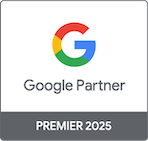
How to target branded keywords: Boost your PPC strategy in 2025
Abisola Tanzako | Apr 25, 2025

Table of Contents
- Branded keywords explained: How they boost your PPC strategy
- Why branded keyword targeting matters
- How to identify and research branded keywords
- Branded keywords and non-branded keywords: Key differences
- Best practices for running branded keyword campaigns in Google Ads
- Case study: Hapag-Lloyd's strategic utilization of branded keyword campaigns
- Common mistakes to avoid when targeting branded keywords
- Strategies for targeting branded keywords
- Emerging trends in targeting branded keywords
- Take control of your branded keywords today
- FAQs
Struggling to convert high-intent users? Many businesses overlook one of the most powerful SEO strategies: targeting branded keywords.
Studies show that branded keyword campaigns have a 50% higher click-through rate than non-branded campaigns (SEMrush, 2024.
Users who search for your brand name are already familiar with your business, making them more likely to convert. If you are not optimizing for these keywords, you miss out on potential customers while competitors swoop in.
Approximately 44% of Google searches involve branded terms, indicating a substantial portion of users are searching for specific brands.
The guide will discuss why it is crucial to target branded keywords, how to implement an effective strategy, and real case studies that show their impact.
Branded keywords explained: How they boost your PPC strategy
Branded keywords are search terms that include a company name, product, or variation of their branding. They can be divided into:
- Pure branded keywords: Example: “Adidas,” “Pepsi,” “Shein.”
- Branded + Product/Service Keywords: Example: “Adidas Air Max shoes,” “Apple MacBook Pro.”
- Branded + Review/Comparison Keywords: Example: “Toyota Model 3 vs. Model Y,” “Samsung Galaxy S20 review.”
- Branded + Coupon/Discount Keywords: Example: “Adidas discount code,” “Shein Black Friday deals.”
- Branded + Location Keywords: Example: “‘KFC near me,’ ‘Burger King in New York.”
Why branded keyword targeting matters
Branded keyword targeting matters for the following reasons:
- Higher conversion rates: Users who search for branded keywords tend to progress further along the buyer’s journey. They already recognize the brand and are more likely to make a purchase.
- Improved click-through rates (CTR): Branded keywords consistently have a higher CTR, as searchers tend to identify with the brand name, resulting in increased trust and engagement.
- Greater brand authority: You reinforce your brand’s authority by ranking for branded terms and deter competitors from poaching your traffic.
- Protection from competitor bidding: Most competitors bid on branded terms in paid search marketing. By ranking for them organically, you reduce the impact of competitors targeting your customers.
- Enhanced customer trust: Your clients expect to find your brand when they search for it. It damages your brand reputation when competitors or unauthorized third parties appear above you in search results.
How to identify and research branded keywords
They include:
1. Utilize Google Search Console: Google Search Console provides valuable insights into the branded terms users search for when visiting your website.
2. Perform a Google Autocomplete Search: Entering your brand name into Google’s search bar will yield popular searches surrounding your brand.
3. Take advantage of keyword research tools: Employ tools such as:
- SEMrush
- Ahrefs
- Ubersuggest
- Google Keyword Planner
4. Analyze competitor strategies: Utilize Google Ads’ Auction Insights or SEMrush’s PPC tools to determine if competitors are bidding on your branded keywords.
Branded keywords and non-branded keywords: Key differences
The key differences include:
1. User intent:
- Branded keywords: High intent: users recognize the brand and are more likely to convert.
- Non-branded keywords: Broad intent: users are exploring options and not committed to a specific brand.
2. Competition:
- Branded keywords: Less competitive, but competitors may bid on them.
- Non-branded keywords: More competitive, with multiple brands vying for the same audience.
3. Conversion rate:
- Branded keywords: Higher, as users are closer to making a purchase.
- Non-branded keywords: Lower since users are in the research phase.
4. SEO & PPC strategy:
- Branded Keywords: Essential for fostering customer loyalty and protecting your brand.
- Non-Branded Keywords: Important for brand awareness and attracting new audiences.
Best practices for running branded keyword campaigns in Google Ads
If you run Google Ads for your brand, branded keywords can be a game-changer. Here’s how to do it:
1. Separate branded and non-branded campaigns: Avoid internal competition and optimize the budget by keeping branded and non-branded keywords in separate campaigns.
2. Use exact and phrase match: Prevent wasted spending by targeting only relevant searches with exact ([yourBrand]) and phrase match (“yourBrand shoes”).
3. Optimize ad copy for trust: Users already know you, so use trust-building words like:
- Official website
- Exclusive deals
- Fast, free shipping
4. Leverage ad extensions: Use site links, callouts, and snippets to direct users to the right pages (home, product, or support).
5. Monitor bids to stay ahead: Competitors bid on your brand name. Use target ROAS or maximize conversions to keep your ad on top at a fair price.
6. Defend against competitors: Use trademark protections and craft more compelling ads to counter competitors bidding on your brand.
7. Add negative keywords: Block irrelevant terms like “free” or “cheap” to attract only high-quality traffic.
8. A/B test and optimize: Experiment with different headlines, descriptions, and CTAs to refine performance and boost conversions.
Case study: Hapag-Lloyd’s strategic utilization of branded keyword campaigns
Hapag-Lloyd, a global shipping leader, leveraged branded keyword campaigns to capture existing customer intent and enhance conversions while using non-branded search campaigns to expand brand awareness.
By targeting niche markets with customized ads, the company effectively engaged both existing and potential customers.
Sustained growth was achieved through global non-brand campaigns and competitive strategies, such as performance-maximized campaigns.
Though specific figures were not disclosed, the approach strengthened brand visibility, customer engagement, and long-term loyalty.
This case underscores the importance of branded keyword strategies in driving high-intent traffic and maintaining a strong market presence.
Common mistakes to avoid when targeting branded keywords
They include:
- Ignoring negative keywords can burn through ad spend on low-intent traffic.
- Weak ad messaging: Using generic or unclear ad copy can reduce click-through rates and erode brand image.
- Not tracking competitor bidding: Your competitors may hijack your branded traffic by bidding on your brand name, driving away potential customers.
- Ignoring organic optimization: Buying paid ads without optimizing for branded organic search erodes overall visibility.
- Not tracking performance: Failing to track branded keyword performance is one way businesses miss opportunities for optimization and ROI enhancement.
Strategies for targeting branded keywords
The strategies include:
1. Optimize your website for branded keywords: Ensure your brand-related content is well-optimized with:
- Title tags & meta descriptions containing branded keywords
- Heading tags (H1, H2, H3, etc.)
- Image alt text
- Internal linking to key branded pages
2. Create high-quality branded content: Develop content that ranks for branded searches, such as:
- Product pages optimized for specific branded terms
- Brand story & “About Us” pages
- Customer testimonials & reviews
- Branded ‘’how-to” guides
3. Dominate local SEO for branded searches: If your brand has physical locations, optimize for branded local searches by:
- Claiming and optimizing Google My Business
- Encouraging customer reviews
- Optimizing NAP (Name, Address, Phone Number) citations
4. Leverage social media and PR for branded search visibility
- Share branded content on social platforms
- Collaborate with influencers and affiliates
- Monitor and engage with brand mentions online
Emerging trends in targeting branded keywords
Emerging trends in targeting branded keywords include
- AI-powered search algorithms, such as Google’s RankBrain and BERT, enhance search intent identification, prompting brands to create contextually relevant content.
- Voice search growth: More individuals are searching using voice assistants, with brand-specific queries like, “Where can I get Adidas shoes near me?”
- Zero-click searches: Google provides direct answers more than ever, making optimization for featured snippets and local packs essential.
- AI-powered chatbots and personalization: Enhancing branded search experiences through intelligent recommendations and customer engagement.
- Adjusting SEO strategies: Brands must ensure their branded keyword strategy is more AI-, voice search-, and evolving search trend-friendly.
Take control of your branded keywords today
Branded keyword targeting is crucial for delivering high-intent traffic, boosting conversions, and establishing brand authority.
Through optimizing your website, implementing PPC campaigns, and monitoring your competitors’ activity, you can achieve top rankings in search results and protect your visibility.
Through effective branded keyword planning, you can gain the trust of your customers and ensure potential buyers seek out your company first. Stay ahead of your competitors by continuously refining your strategy with SEO tools and metrics.
FAQs
Q.1 Do I bid on branded keywords in PPC campaigns?
Yes. Bidding on branded keywords prevents competitors from stealing your traffic and lets you control the message.
Q. 2 How do I prevent competitors from ranking for my branded keywords?
You cannot stop it entirely, but you can:
- Optimize your site for branded terms
- Bid on your own branded keywords in Google Ads
- Establish brand authority with high-quality content and backlinks
Q. 3 Are branded keywords effective for SEO?
Yes. They will likely be responsible for achieving higher CTRs, improved conversion rates, and fostering brand trust.
Q. 4 How do I measure the performance of my branded keywords?
To monitor rankings and traffic, utilize Google Search Console, Google Analytics, and keyword analysis tools such as SEMrush or Ahrefs.





